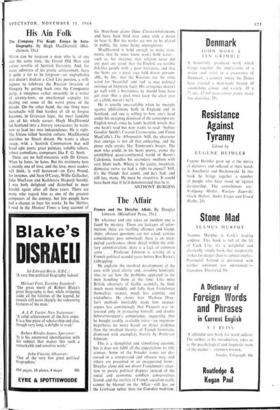His Ain Folk
Mum can be forgiven a man who is, at one and the same time, the Grand Old Man and enfant terrible of Scottish literature. And, for many admirers of his poetic achievement, there is quite a lot to be forgiven—an anglophobia that doesn't disdain a Civil List pension, a will- ingness to celebrate the Russian invasion of Hungary by getting back into the Communist party, a smugness rather unseemly in a writer of seventy-four, an unashamed capacity for dealing out some of the worst prose of the decade. On the other hand, the one thing most Sassenachs will find hardest of all to forgive becomes, in Grievean logic, the most laudable aim of his whole career. Hugh MacDiarmid led Scotland into a literary renascence; he wants now to lead her into independence. He is right. The Union killed Scottish culture. MacDiarmid cherishes no Stuart dream. He wants a clean sweep, with a Scottish Communism that will breed epic poets, great painters, voluble talkers, robust comedians, composers like F. G. Scott.
There are no half-measures with Dr Grieve. When he hates, he hates. But his testimony here is mainly one of love, and the love, most readers will think, is well bestowed—on Ezra Pound, for instance, and Sean O'Casey, Willie Gal lacher, John MacLean and Kaikhosru Shapurji Sorabji. I was both delighted and disturbed to meet Sorabji again after all these years. There are many who regard him as one of the greatest composers of the century, but few people have had a chance to hear his works. In the 'thirties, I read in the Musical Titnes a long account of his three-hour piano Opus Clavicembalisticum, and have been fired ever since with a desire to hear it. But his works are not to be played in public, the times being unpropitious.
MacDiarmid is bold enough to make state- ments that he must know won't hold water— such as, for instance, that religion never did any poet any good: that the English are terrible fish-like people with a poor literature, and that the Scots are a great race held down, presum- ably, by fins; that the Russians use the same word for 'beautiful' and 'red' la nice political twisting of linguistic fact). His arrogance doesn't go well with a boyishness he should long have got over (but a poet must keep the clear eyes of a child, mustn't he?).
He is usually unassailable when he inveighs against philistinism, both in England and in Scotland, and one is willing to bow one's head under his sweeping dismissal of the contemporary English novel, since he lauds Scottish novels that one hasn't read but now wants to read—Sydney Goodsir Smith's Carotid Cornucopias and Fionn MacColla's The Albannaich. Still, the character that emerges is not all that endearing, and the prose style creaks like Tennyson's braces. The man who could, in his Scots poetry, evoke the uninhibited quasi-continental world of Burns's Caledonia, handles his secondary medium with very blunt tools. Where is the gaiety, invention, dionysiac verve we had a right to expect? Still, it's the friends that count, and he's had, and still has, many. He must be simpcitico. It would have been nice if he'd demonstrated that he is.
ANTHONY BURGESS






































 Previous page
Previous page